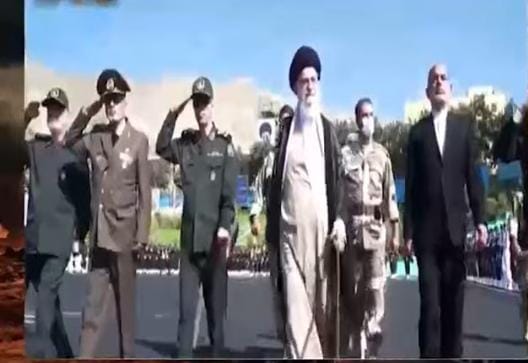Hasnain Naqvi in Doha-
As Israel launches a surprise military strike and the U.S. aligns with Netanyahu, Iran’s Supreme Leader Ayatollah Ali Khamenei stands unflinching—alone yet defiant in the face of overwhelming odds.
In a region plagued by geopolitics, preemption, and power play, Iran’s Supreme Leader Ayatollah Ali Khamenei has emerged as an unlikely fulcrum of resistance. On Wednesday, in a rare public statement broadcast live on Iranian state television, Khamenei broke his silence following Israel’s sudden military assault on Iran, asserting in unequivocal terms that the Iranian nation “will not surrender.”
Khamenei’s remarks come in response to mounting international pressure and a blunt call from U.S. President Donald Trump for Iran’s unconditional capitulation. In a voice laden with resolve, the statement declared, “Intelligent people who know Iran, the Iranian nation, and its history will never speak to this nation in threatening language because the Iranian nation will not surrender.”
He further warned, “The Americans should know that any U.S. military intervention will undoubtedly be accompanied by irreparable damage.”
This response, austere and unyielding, comes at a time when Iran finds itself encircled—militarily, diplomatically, and ideologically—by a powerful Western alliance that appears to have endorsed Israel’s actions, even as the region inches closer to a catastrophic confrontation.
Israel’s Pre-emptive Strike: A Calculated Disruption
On Friday, June 13, as U.S.-Iran negotiations approached a crucial sixth round set for June 15, Israel launched a surprise military offensive against Iranian targets. The attack, timed with surgical precision, disrupted the diplomatic process and sent shockwaves through the global community. Analysts believe the strike was designed to derail any possibility of détente between Washington and Tehran—a prospect that could have diminished Israel’s strategic leverage in the region.
This offensive was not merely military; it was symbolic—a message that Israel would not countenance any geopolitical arrangement that reduced its supremacy. Iran’s diplomatic and military establishments were caught off-guard, and Tehran suffered considerable losses. Still, it did not buckle.
A Familiar Pattern: History’s Echoes in Today’s Wars
To critics and observers alike, the attack underscored the transformation of Israel under Prime Minister Benjamin Netanyahu. What once aspired to be a democratic bulwark in the Middle East is now increasingly seen through the lens of ethno-nationalism and expansionism. Comparisons have emerged between Netanyahu’s Israel and fascist regimes of the past—most notably Hitler’s Germany. It’s a charged analogy, but one that is gaining currency in parts of the Global South, particularly among those who see in Gaza’s starvation and Iran’s isolation echoes of history’s darker chapters.
Just as Hitler wielded power with the support of Axis allies, Netanyahu today finds himself backed by the United States and key Western nations. The recent G7 resolution, which affirmed Israel’s right to self-defence, has only reinforced suspicions in the region that the global order remains aligned with power, not justice.
Iran: A Solitary Stand Against the Axis of Power
What makes Iran’s current predicament particularly stark is its solitude. Despite long-standing ties with Russia and China, neither nation has stepped in militarily to support Iran. Their condemnations have been perfunctory at best, more diplomatic theatre than strategic alliance. Tehran now finds itself in a David-versus-Goliath battle—not just against Israel, but against a constellation of Western powers arrayed behind
Hasnain Naqvi, a former member of the history faculty, St. Xavier’s College, Mumbai. He writes on diverse topics ranging from History, Culture, Politics and Contemporary issues





